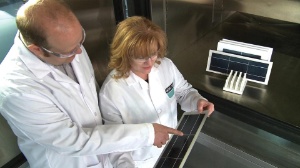Jul 21 2010
Researchers at Dow Corning and The University of Toledo (UT) announced today that the organizations have signed a memorandum of understanding to engage in collaborative discussions on photovoltaic (PV) solar research and development efforts to help reduce the cost of solar energy to make it a viable and economically competitive energy option globally.
“Both Dow Corning and UT want homes and businesses throughout the world to take advantage of clean, renewable energy from the sun,” said Gregg Zank, senior vice president and chief technology officer of Dow Corning. “It is essential that businesses, academics and the government collaborate in order to accelerate the advancement of solar technologies.”
 Dow Corning Solar Solutions researchers seek to make solar energy economically competitive with traditional energy sources.
Dow Corning Solar Solutions researchers seek to make solar energy economically competitive with traditional energy sources.
"UT's capabilities for industrial collaboration have been greatly strengthened over the last three years through the founding of the Wright Center for Photovoltaics Innovation and Commercialization - PVIC in 2007,” said Prof. Robert Collins, the Center's Principal Investigator, a Distinguished University Professor and the NEG Endowed Chair in Silicate and Materials. "PVIC affiliated faculty are committed to a collaboration with Dow Corning in which UT's expertise in photovoltaic thin film and nanomaterials research and solar cell development complements Dow Corning's global leadership in materials for PV manufacturing and installation. PVIC faculty are also deeply committed to our shared goals of lowering the cost and increasing the performance of the next generations of photovoltaics products."
The proposed collaboration between Dow Corning and UT, which could include the addition of other universities or businesses in the future, offers researchers from both organizations the opportunity to share data and technology while allowing both to protect their intellectual property.
The UT has a long history of scientific research and industrial collaboration in thin-film photovoltaics. Faculty members from various departments at UT have been actively involved in research and development of PV materials, devices, and manufacturing for more than 25 years. UT is a leadership node of the Wright Center for Photovoltaics Innovation and Commercialization, a world-class science and technology platform established by the state of Ohio to further the research and applications of clean electricity generation.
Dow Corning’s silicon-based materials are used in solar cell manufacturing, solar module assembly and installation. In the past five years, Dow Corning and its joint ventures, the Hemlock Semiconductor Group, have announced investments of more than $5 billion to research and develop as well as to expand production of materials critical to the solar industry.
Dow Corning currently has two Solar Solutions Application Centers in the United States, with similar facilities under construction in Europe and Korea. These facilities enable Dow Corning engineers and scientists to work closely with solar energy leaders to research, develop, evaluate and test silicon and silicone-based materials solutions for use in solar cells and modules.
Both Dow Corning and UT have been active in engaging U.S. policymakers to support alternative energy growth in the U.S.
Source: http://dowcorning.com/